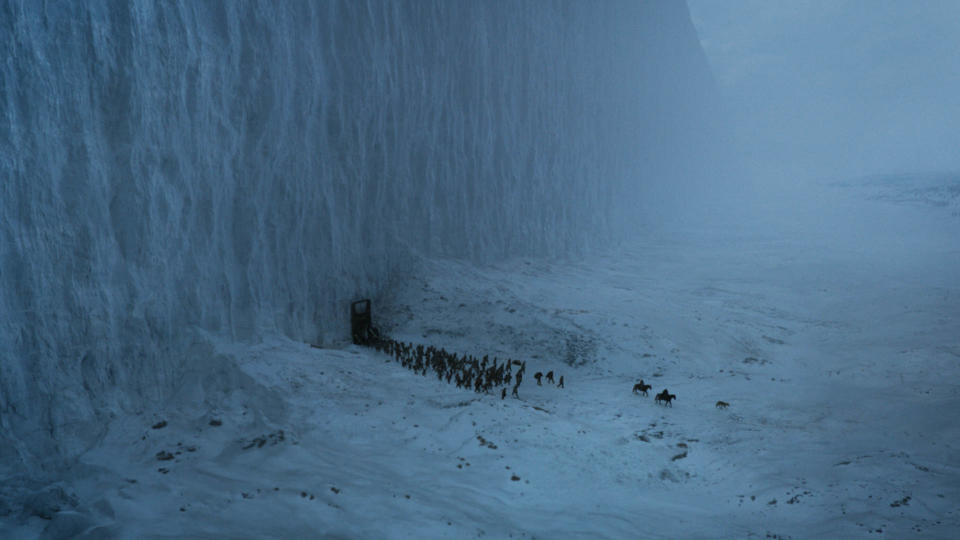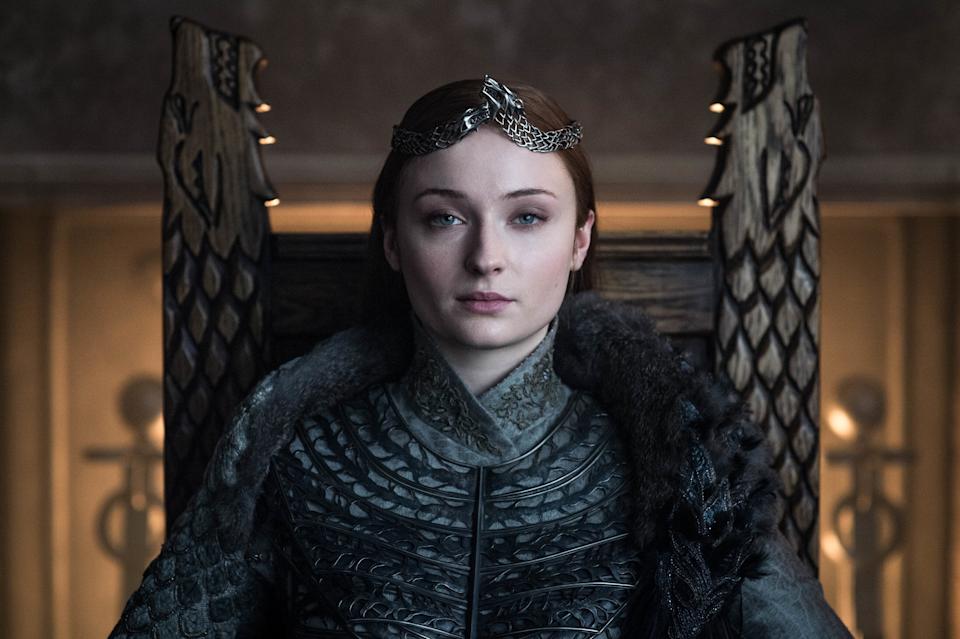5 burning questions 'Game of Thrones' didn't answer in the series finale
Heading into the series finale of Game of Thrones, the biggest question showrunners David Benioff and D.B. Weiss had to resolve was, “Who gets to sit on the Iron Throne?” (That query was so paramount, they even called the episode, “The Iron Throne.”) And that answer is… no one. But not in a Faceless Men kind of way. The Iron Throne will never have another occupant because it literally doesn’t exist anymore: In a moment of grief-fueled fury, Drogon destroyed the very thing his mother had fought so hard to win. And while Westeros won’t be without a ruler going forward — all hail King Bran the Broken — the symbol of royal power will have to evolve with the times. If good Maester Samwell has any say, maybe one day they’ll even have an Oval Office!

In the process of settling that particular story point, though, Benioff and Weiss neglected to address some of the questions raised by the finale, as well as several more that have built up in fans’ minds over the course of the past eight seasons. Here’s hoping George R.R. Martin decides to sew up one or more of these dangling plot threads if and when he finishes those last two books.
Who was the Night King, really?
Here’s the easy answer: He definitely isn’t Bran Stark! After the future king paid a mental visit to his zombie-raising royal counterpart in Season 6 — and acquired a scar for his troubles — the “Bran is the Night King” theory took root like House Stark’s weirwood. And even if you didn’t subscribe to that particular bit of fan speculation, there were plenty of other semi-plausible (or, at least, awesomely silly) explanations floating about. He’s one of the ancient Starks! No, he’s the Azor Ahai! No, wait! He’s Jon’s real father! Basically, fans were so starved for information about this supposedly unstoppable enemy, that they rushed in to fill the void left by Benioff and Weiss.

To be fair, the duo did offer the barest sketch of an origin story back in the sixth season, around the same time that Bran was trying to do some incognito spying on the Night King. That’s when Leaf — one of the last remaining Children of the Forest — disclosed that her ancient race had transformed one of the First Men into a being capable of raising the dead and fighting the living invaders he once called kin. Ultimately, human man and forest child were forced to unite to defeat the zombie menace the latter had created in a war known as the Long Night. In the aftermath, the White Walkers were driven into hiding for millennia, re-emerging now to erase the history that the ancient war’s victors had written.
While that answers where the Night King came from, we still don’t know — and, at this point, may never find out — who he was. Perhaps his pre-zombie identity doesn’t really matter in the long run, but the thought that this larger-than-life enemy has just been some random First Man all along is, at best, deeply unsatisfying. Just as Tyrion argues at the end of “The Iron Throne,” there’s nothing more powerful in the world than a good story, and the Night King’s story had the potential to be truly mythic, showing how one person from the distant past can nevertheless shape the present and future.
Before you mourn the Night King all over again, keep in mind that a Game of Thrones prequel series will be entering production later this year. And the working title of that series, according to Martin anyway, is — you guessed it — The Long Night. So we may just get a name to go with that ugly face after all.
Game of Thrones should’ve ended like the Usual Suspects with Bran getting up and walking away as Jon Snow suddenly realizes his little brother/cousin was actually the Night King all along and drops that coffee cup from 2 episodes ago in slow motion.
— The Volatile Mermaid (@OhNoSheTwitnt) May 20, 2019
So the Night King meant ..... nothing ?? No further storyline or backstory on that?? Okay... #Gameofthrones #nightking pic.twitter.com/n5MT2r05RC
— kate newk (@katenewk) May 20, 2019
Imagine how frustrated you’d be after watching 20+ movies then Marvel told you the Infinity Stones actually aren’t important.
That’s what #GameOfThrones did with Bran and the Night King.— Ben Hoffman (@bhoffman19) May 13, 2019
Why bother with the Night’s Watch?

Jon Snow traveled a long road to end up back where he started: a member of the Night’s Watch, with no House or family to call his own. But in a post-Night King world, what exactly is the Night’s Watch mission? The giant wall they used to protect lies in ruins, and the realm’s new Master of Coin has other construction projects he’s allotting funds for first. And it’s not like there’s anyone to keep out anymore: The White Walkers all went boom thanks to Arya’s special finishing move and the Free Folk are friends, not foes.
Even Jon seems to recognize the pointless of remaining at Castle Black, immediately following Tormund Giantsbane and the rest of the wildlings out into the thawing tundra. That’s almost certainly what Tyrion knew would happen when he persuaded Grey Worm and the other Houses to accept Snow’s permanent exile over death. If we may draw a comic book parallel, Jon gets The Dark Knight Returns ending: He’ll leave them alone now, and in return he’ll stay quiet. Living in the lands beyond the wall will be a good life. Good enough.
What is the Night’s Watch now? A ski club? #gameofthrones
— Will Deasey (@deasey_will) May 20, 2019
The night’s watch trying to find something to watch for now #GameofThrones #gotfinale pic.twitter.com/oObdObHS70
— Louie V (@Real_Louie_V) May 20, 2019
jon returning to the night's watch for literally no reason #GameofThrones pic.twitter.com/hP0auZwRQ2
— dalton 🐺🚀 (@wolfastronaut) May 20, 2019
Where did Drogon take his mom?

In the immediate aftermath of his mother’s passing, her last surviving dragon child unleashes his rage on her killer: the Iron Throne, not Jon Snow. Part of that choice of target has to do with the fact that Jon has Targaryen blood coursing through his veins, which makes him fireproof. But we like to think that Dany’s savviest kid (sorry Rhaegal and Viserion!) groks the power of metaphor. Melting the Iron Throne is Drogon’s way of breaking the wheel that his mother spoke about, consigning that symbol of royal oppression to the past. Having accomplished that, he tenderly picks up Dany’s prone body and flies away to parts unknown.
Well, not that unknown. One of the downsides of being a giant winged creature is that it’s not all that easy to hide from royal spies or kings with warg-ing abilities. In the show’s final moments, it’s revealed that Drogon has been spotted in the east, which suggests a somber trip to the Targaryen homeland of Essos to lay Mom to rest. And after that, Drogon may head to one of his previous haunts in nearby Valyria, where some believe other dragon eggs may be hidden. All we can say is that if Drogon decides to fly west of Westeros to join Arya on her solo adventures, we’ll be there for that spinoff.
daenerys has been resurrected by kinvara and will be living the rest of her days in essos with drogon, at the house with the red door and the lemon tree #GameOfThrones pic.twitter.com/06HPvjGxDg
— ً (@targarcyn) May 20, 2019
Dany brought by Drogon to Valyria, some Essos wizard would revive her using uncracked dragon egg. She'll become Fire Queen with little memory of her past and has the ability to control grey-scaled men. There, that may fix it, 😅 #GameOfThrones #TheFinalEpisode
— Arman (@armanke13) May 20, 2019
Very much looking forward to the Game Of Thrones spin-off Drogon & Daario: The Only Way Is Essos. #GameOfThrones #got #GameOfThronesFinale
— Richard Luck (@RMGLUCK2017) May 20, 2019
Did any of the prophecies matter?

If you think the “Prince that was promised” is a promise that was broken, you’re not alone. Many have noted that, on first glance, the prophecy of the Azor Ahai — the one who will beat back the darkness in the form of the Night King — wound up not playing a major role in the show’s endgame, at least in regards to the destiny of long-presumed Azor Ahai. After all, it was Arya who took care of Night King killing duties, thus fulfilling a portion of a separate prophecy — one spoken by Melisandre that involved brown eyes, blue eyes and green eyes — that also didn’t end up being entirely accurate. En route to closing Cersei’s green eyes forever, the young assassin was convinced by the Hound to discard her kill list. She significantly didn’t scratch Cersei’s name off and replace it with Daenerys, despite witnessing the destruction the Mad Queen wrought.
It fell to Jon to end Dany’s short reign and, in doing so, some are advancing the argument that he became the Azor Ahai after all. In this reading of the prophecy, it’s Daenerys, rather than the Night King, who represents Westeros’s true source of darkness, based on her desire to keep fighting the larger war against slavery and injustice even after triumphing in the so-called Last Battle. Not for nothing, but the Azor Ahai of legend also had to kill the woman he loved in order to bring the light back to a darkened world. Our prophecy is that fans will argue about this until the stars bleed with the scent of smoke and salt.
#GameOfThonesFinale#GameOfThrones
"Jon Snow is Azor ahai"
"Bran is the Night King"
"Jamie will kill Cersei"
"Littlefinger is still alive"
"Varys is actually a mermaid"
"Arya will kill Cersei(Green eye)"
D&D Reading Fan Theories after writing the story:
pic.twitter.com/sSesTtA1t5— MJ-Phoenix (@FireWPhoenix) May 20, 2019
#Spoilers for @GameOfThrones. So... The Azor Ahai prophecy speaks of a hero that, in order to vanquish great evil, must plunge his sword into his beloved. And you want to convince me that didn’t happen yesterday? pic.twitter.com/QMTBPsTVvb
— LodiX (@lodix1) May 20, 2019
does Jon killing the love of his life, and then fire being brought to thousands of swords officially make him Azor Ahai #gameofthrones #JonSnow pic.twitter.com/oFVrCuwOV7
— Jake Gutierrez (@da_gutz7) May 20, 2019
Will HBO fund a Season 8 do-over as millions of fans have demanded?

Not a chance, because it will make Sophie Turner angry. And you wouldn’t like her when she’s angry.
Game of Thrones is available to stream on HBO Go and HBO Now.
Read more from Yahoo Entertainment:



